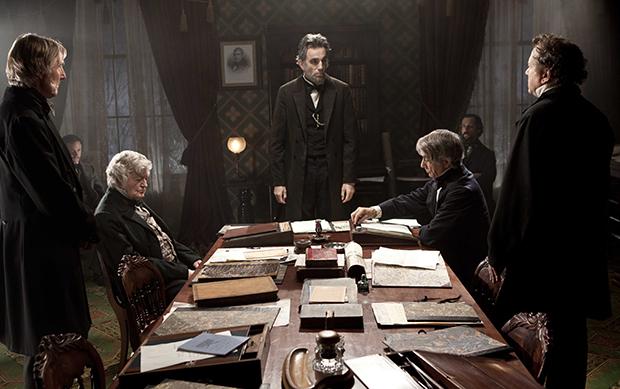As the presidential election slowly fades from the country’s consciousness, it is replaced by another set of elections: Qwards season. “Django Unchained” and “Lincoln” are two of the most talked-about films of the season, marking an Obama-era exploration of the politics of race and America’s continued struggle with the fallout from slavery.
“Django Unchained,” Quentin Tarantino’s spaghetti-Western style exploration of slavery in the 1860s, follows the bounty-hunting exploits of Dr. King Schultz (Christoph Waltz) and freed slave Django (Jamie Foxx). Schultz enlists Django’s help after promising to help him rescue his wife Broomhilda (Kerry Washington) from Candyland, a plantation run by Calvin Candie (the deliciously nasty Leonardo DiCaprio). The entire film, which Tarantino places in dialogue with his Nazi-hunting “Inglorious Basterds” (2009), is marked by the director’s signature extreme violence.
While Lincoln (Daniel Day-Lewis, in a stunning turn) struggles with the morality of slavery in the movie of the same name, the rest of the movie turns it into a political and economic question for those in power. Most of the film centers on old white men with strangely groomed facial hair vying for political control. African American characters seldom appear; the audience sees one house servant, (though she has a epiphanetic scene with Lincoln outside the White House one night) and two black soldiers speaking with Lincoln in the opening scene.
In contrast to “Django,” which deals with slavery in its most brutal forms, Steven Spielberg’s Lincoln approaches the issue from a distant place of privilege. While Django and Dr. Schultz rise up and physically attack slavery in a horrifically bloody shootout, President Lincoln approaches the issue from the abstract side of the law. While both films are personal narratives, they each highlight the effects of slavery from a unique perspective.
While Obama’s election suggests that the nation may be moving into a post-racism era, vestiges of slavery continue to influence race relations in America. Dr. Stephen Jones, the keynote speaker who kicked off Urban’s Month of Understanding on Jan. 18, urged students and faculty to examine both overt and covert “isms.” He cited personal experiences with racism; the fact that his high school in Louisiana still hosts segregated proms drew a gasp from the students.
Race relations have seemingly become more prevalent in the conversation of film in recent years: movies like “The Help” (2011) gave us a nuanced portrait of black females but still fell prey to the “great white savior” complex. “Flight” (2012), starring Denzel Washington, touched on race but did not center on it; it simmered under the surface of his investigation but was not discussed covertly.
The continued presence of “isms”s seems to be in the forefront of Tarantino’s spaghetti Western. Clarke Weatherspoon, Urban’s 9th and 10th grade dean, hosted a forum to discuss Django and kick off the Month of Understanding. He said that he admired Tarantino’s lack of sugarcoating and his success in “making the audience uncomfortable. You’re laughing at things you shouldn’t be laughing at … The audience I saw the film with was laughing at the n-word.”
Weatherspoon also hypothesized that the main character of Django was not the newly freed slave, but instead the white, German bounty hunter. Indeed, Django’s motives are consistent and uncomplicated, while Schultz goes through the most noticeable character development. Tarantino’s own exploration of his white privilege seems evident in his portrayal of white characters; perhaps he sees himself both in Dr. Shultz and in Candie.
As America continues to explore and reflect on our messy history of slavery and racism, the movie industry – one of our most valued forms of expression – will continue to battle with the reverberations of privilege and oppression.

